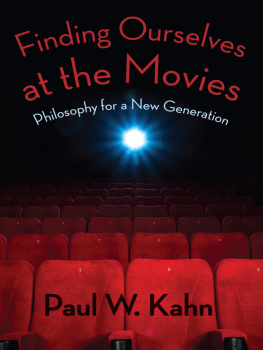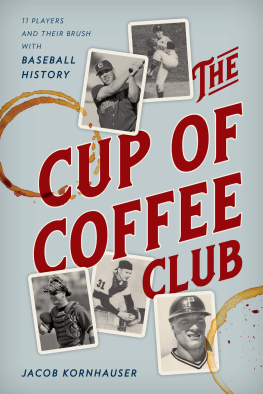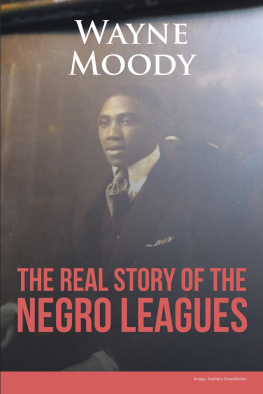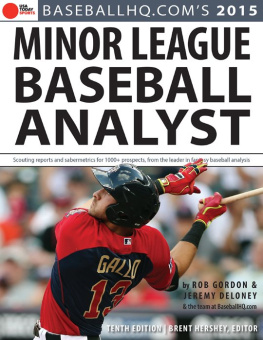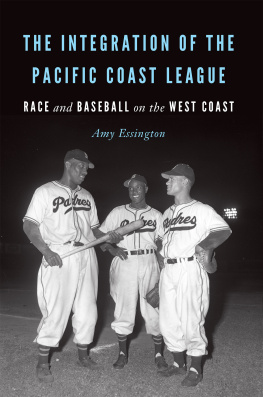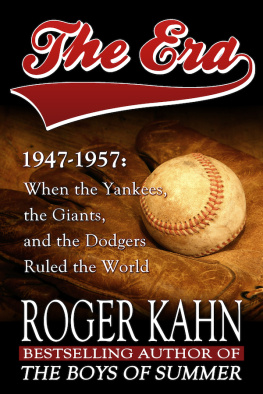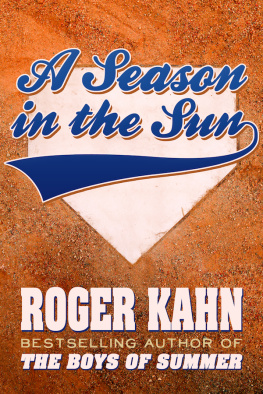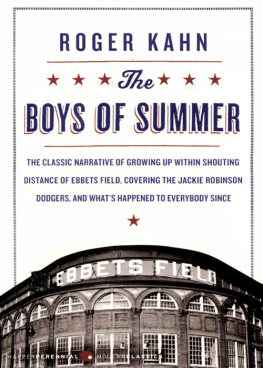For more information, email info@diversionbooks.com.
First Diversion Books edition October 2012.
The Nine-year-old Right Fielder
The first dream, full of innocence and sunlight, is to play the game. The dream shines, with that same eerie, morning light of promise, at Renton, Washington; along Spring Garden Road in Lincroft, New Jersey, and on West Arthur Street, Chicago. To play the game. To play the game superbly. To play with such a brilliant, sunlit, morning grace that the dream itself leaves you at length, like Caliban, able only to speak fragments. The clouds would open and show riches/Ready to drop upon me.
I remember versions of my small baseball fantasy from loving and faraway days when ball players wore uniforms of hot, baggy flannel and television existed only in the laboratories (and fantasies) of arcane electrical engineers. (Electrical engineers once seemed as arcane as alchemists.)
You could pitch, like Christy Mathewson, Van Lingle Mungo or John Whitlow Wyatt, and then the batters, aggressive, mean-spirited mennone seemed to have shaved this morningquailed before your fast ball and your swift, snapping curve. Or you could hit. Now the pitcher became a foul, murderous brute who stared out of a storm-cloud visage. He knocked you down and cursed you with what people, in baggy flannel days, described, in studied loathing, as foul epithets. You stood against his fast ball, his swift, snapping curve, and drove a long, high drive that climbed the sky.
After that long-sounding thwack and a blur of base runners, you were borne shoulder high by exulting teammates. In the crowd beyond, your father cheered and your mother brought both hands to her face, her cheeks glistening with pride. Somewhere else in the careful tapestry of the imagined throng sulked a regretful, baby-doll face. It was the girl who let you get away.
The ball players were seated along wooden benches, anchored to the floor, beneath two rows of orange lockers inside a stout, brick blockhouse of a building. Forty years earlier, W.P.A. workers had laid and cemented every brick. Only four of the players had so much as heard of the Works Progress Administration. I either read it in history, said a catcher named Mark Krynitsky, or my Dad, or his Dad, worked for the W.P.A. I dont know.
Light entered through two opaque windows backed by metal grills, and fluorescent tubes glared overhead. The team assembled in the weathered (some would add socialistic) brick was called the Blue Sox and they played their home games in the historic community of Utica, New York. Historic, but in a baseball sense obscure. Those sunlit boyhood dreams project you far beyond a drab clubhouse in Utica; you see yourself moving on winged spikes through carpeted, indeed hallowed, dressing rooms in Los Angeles or New York City.
Still, the Blue Sox were professionals. Their abilities resembled the skills of major leaguers far more closely than the enthusiastic fumblings you see among high school athletes. Professionals in a W.P.A. clubhouse.
Most would be earning $500 a month. Out of that they had to pay taxes, rent, living expenses and meals when the Blue Sox played at home. The cars they drove were small or old or both. But the good athletes, the ones who would turn out to be good, felt pride in their professionalism. Poor, unpampered, they were professional ball players, the job description that covered Mickey Mantle, Willie Mays and Steve Garvey. On this particular hot June day the manager was hurling forward a campaign, a personal crusade, to give these twenty-five young people, the Utica Blue Sox, a sense of their own professionalism.
I was sitting in the clubhouse not as an auditor, with an intrusive curiosity about the inner workings of a ball club, nor even as a journalist granted, as it were, a privileged pass from the manager in exchange for the promise of a favorable story. I was sitting there, bless my wallet, as a principal stockholder and president and chief executive officer of the team.
Since running a successful election campaign in the sub-senior bunk at Camp Robinson Crusoe forty-five years earlier, I had not been president of anything. I took my motto from William Tecumseh Sherman: If nominated I will not run; if elected, I will not serve. Aside from that, I dont recall ever being offered any kind of nomination for any kind of office across all those decades. As a writer, I presided over my prose. Typically, I stood as far from high office as Walter Mondale found himself one November morning in 1984. (Or farther yet.)
Now in the clubhouse in the warm June of 1983, I viewed my new-won presidency with resolute optimism punctuated by spasmscellos playing in a minor keyof undressed and unarmored alarm. Those friends of mine who knew the least about baseball suggested that being president of a low minor league club would provide me with an ultimate toy, far better than my latest stereo set, more fun even than a black Mercedes sports car that an entrancing lady had once offered up as an adjunct to a romance.
Other friends, who knew somewhat more baseballsay, for example, that minor league teams can go bankruptput forth temperate forecasts. Best way to look at it, said one of these, possessed of a dogged literary manner, is that youre taking over the Pequod. Now maybe youre going to find that old white whale. But maybe youre not.
My cherished Brooklyn Dodger friend Carl Furillo, a veteran of twenty years of glorious professional ball playing, took a colder view. Youre taking over a minor league club? In Utica? Youre president? Youll be lucky if you dont have two ulcers by Labor Day.
Whaling voyager or ulcer candidate, I was at the true beginning of the Adventure. Traditionally, of course, baseball seasons open in April. That is a marvelous month to start, particularly in the North where some April days sting with the afterbite of winter and others glow with summer promise. That summer promise and the game of baseball fuse.
But in the low minor leagues in upper New York State April is no month to play professional ball. Spring rains muddy the fields and the small grounds-keeping staffs are no match for the elements of early spring. Besides, the nightsand minor league baseball is a nighttime sportbite with winds curling coldly from the Adirondack Mountains. In April local fans prefer beer, bowling or warm living rooms to baseball. So this June day in this hot clubhouse was the backdrop for a final preseason meeting for the Blue Sox. We were beginning, we were all beginning, although by then the major league season was two months old.
Now listen up, everybody, the manager said. He was a powerful six-footer, thirty-one years old, with straw hair and a remarkably mobile face. He had firm even features and a lantern jaw and sometimes under his straw-colored hair the manager, Jim Gattis, looked like a movie version of a grown-up Huckleberry Finn. Sometimes, later, when his blue eyes raged and his mouth set and his jaw jutted, Jim Gattis was a sadistic drill sergeant. Then he looked at his charges with equal measures of hatred and contempt. Baseball, he would say, is not like life. It






